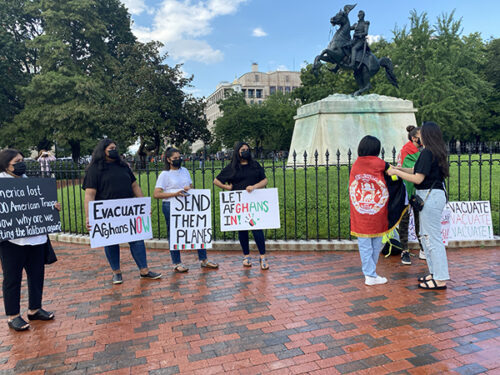
NEW YORK — The International Monetary Fund on Aug. 23 withheld $455 million in emergency COVID-19 relief funding from Afghanistan after the Taliban’s takeover of the country forced the organization to withhold its recognition of the Afghan government.
The withheld funds are a part of $650 billion in emergency reserve funds, known as the IMF’s Special Drawing Rights, that the organization made available to countries worldwide on Aug. 23.
Eric LeCompte, the executive director of Jubilee USA Network who has for months advocated for the creation of these funds alongside the United States Conference of Catholic Bishops (USCCB) and other religious groups, told The Tablet that’s it’s unfortunate Afghanistan won’t receive the funds, but called it a “good move” for the IMF given the country’s unstable situation.
“There are real questions when you don’t know how the government is going to act, you don’t know who the authority is, or who’s in charge, where the IMF has to pull back its recognition of the government in order to ensure that money is being spent correctly,” LeCompte said. “So, unfortunately, it will have, I think, a negative impact on the people just as all of the questions around a government transition in Afghanistan right now.”
The IMF is an organization of 190 countries that works to ensure the stability of the international monetary system.
LeCompte explained that Afghanistan’s portion of the funding is still set aside exclusively for the country, it’s just a matter of if and when the organization recognizes the country’s government, which he predicts will eventually happen.
Among the IMF’s 190 member countries there are different types of governments. Therefore, LeCompte noted that the organization is likely to recognize Afghanistan “once they believe that there’s a competent authority in place and their policies are moving forward in a judicious way.” He added that the recognition is something a new government in Afghanistan should want.
“If the IMF at some point does move forward with recognition it would give a lot of validity to the Taliban government to continue to seek international recognition from the United Nations and other places,” LeCompte said. “It’s clear that because of financing, aid, working with the global community, a new government of Afghanistan wants to be recognized.”
For those countries that received the funding from the IMF, it has no strings attached and a government has the discretion to use how it deems best. The idea, LeCompte said, is for countries to use the money to deal with the economic crisis, to provide stimulus for their people, and buy vaccines.
The latest COVID-19 figures out of Afghanistan are 152,511 cases, 7,070 deaths, and 1,201,286 vaccine doses administered to its nearly 40 million residents as of Aug. 23, according to the World Health Organization.
Haiti, another country in the midst of a crisis following a 7.2 magnitude earthquake that hit the Caribbean nation on Aug. 14, and a next to zero vaccination rate, received $195 billion from the IMF’s Special Drawing Rights.
How much money a country receives is based on its quota of the IMF. In total, about $275 billion of the funds is going to emerging and developing countries, of which low-income countries will receive about $21 billion, according to the IMF.
The United States received about $113 billion dollars, with the G7 countries as a whole — Canada, France, Germany, Italy, Japan, the United Kingdom, and the United States — receiving about $282 billion, according to data compiled by Jubilee USA Network. Brazil, China, and India were three of the other highest earning countries with about $15 billion, $17 billion, and $41 billion in allocated funds respectively.
Kristalina Georgieva, managing director of the IMF, called the allocation a “significant shot in the arm for the world” that presents “a unique opportunity to combat this unprecedented crisis.”
LeCompte said even though wealthier countries received a larger allocation of the funds, the hope is they’ll donate that money to developing countries in need.
“We want to see that money donated to support developing countries as they continue to confront the COVID-19 crisis,” LeCompte said.
The White House did not return The Tablet’s request for comment on how the money will be used.
Bishop David Malloy of Rockford, chair of the USCCB Committee on International Justice and Peace, issued a joint letter with LeCompte to the Biden administration in February advocating for the government to lead efforts in allowing the world to access these emergency reserve funds and economic recovery efforts as a whole.
“The U.S. Government is vital to ensuring the world emerges from this pandemic with greater resilience and an understanding of the greater interconnectedness of humanity,” the letter said.
